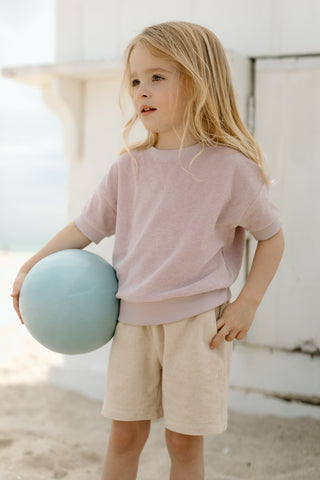Spring to Autumn, there are plenty of sunny days ahead ripe for baby’s first beach day. It’s simple to pack up a designated beach bag for the season and repurpose your trusted diaper bag for a day of fun in the sun! In anticipation of warmer weather ahead, prepare your little one for beach days by packing the ultimate baby beach bag. Whether you’re lakeside or oceanside, read on for a helpful checklist for going to the beach and our best ideas to keep everything sorted.

5 Tips For Packing Baby Beach Bag
Using this checklist to pack a baby beach bag ensures both you and your little have the best time together. Remember to pack doubles of everything, like extra organic cotton clothing in case your little needs a change. Take the guesswork out of packing to ensure all goes smoothly!
Here’s 5 things every parent needs to pack in a baby beach bag:
- Choose a designated bag that’s always stocked. Instead of unpacking and repacking a baby beach bag every time you want to hit the sandy shores, repurpose your trusty diaper bag. This way, you’re always ready to go on a whim and won’t need to worry about forgetting to re-pack your little’s beach bag (do a wash when you get home and re-pack it with fresh clothing and swimwear so you’re ready for the next outing).
- Lightweight organic cotton clothing. The comfier your littles are, the longer they’ll happily splash and play at the water’s edge. Dressing littles in the summer means choosing breathable fabrics (and cute outfits for all those sun-kissed family photos!). Don’t forget yourself–you’ll also need a lightweight change of women’s clothing to stay comfy and dry.
- Several large swaddles. A muslin swaddle has many functions–a blanket for sitting on, a sun-shield draped over the stroller or car seat, a towel for drying off (bring a couple extra in case one gets wet). If you’re nursing, use an airy, lightweight swaddle to keep sun off of your little one’s face during beachside feedings.
- Travel changing pad. Since infants and toddlers usually wear swim diapers in the water, it’s important to note they aren’t very absorbent and won’t hold urine. If you’re at the beach for longer periods, pack up wipes and regular diapers too and prepare for either changing your little in the car on a portable changing pad or laid out on the beach.
-
Sun protection. Even if it’s overcast or chilly, your little’s skin is sensitive to the sun’s rays. Pack up bucket hats, sunglasses, mineral sunscreen (tucked into a mini pouch or pouch), lightweight organic cotton clothing, UPF50 swimwear along with cozy clothes for post-swimming like sweatshirts and hooded poncho towels.
Takeaways
Lose the worry and embrace frequent beach days ahead with our checklist for going to the beach. Though the days of reading leisurely or watching the waves may be temporarily on hold, packing the perfect baby beach bag helps ensure a relaxing experience for you and your little one. Beyond the essentials you’ll need, don’t forget the extras like beach toys, life vests and floaties, drinks and snacks, a dry bag, and anything else that helps maximize happy moments. We hope our checklist for how to pack a baby beach bag has you feeling excited for the sunny moments ahead. If you pack a beach bag–and pack it well–beach days will be easier!



